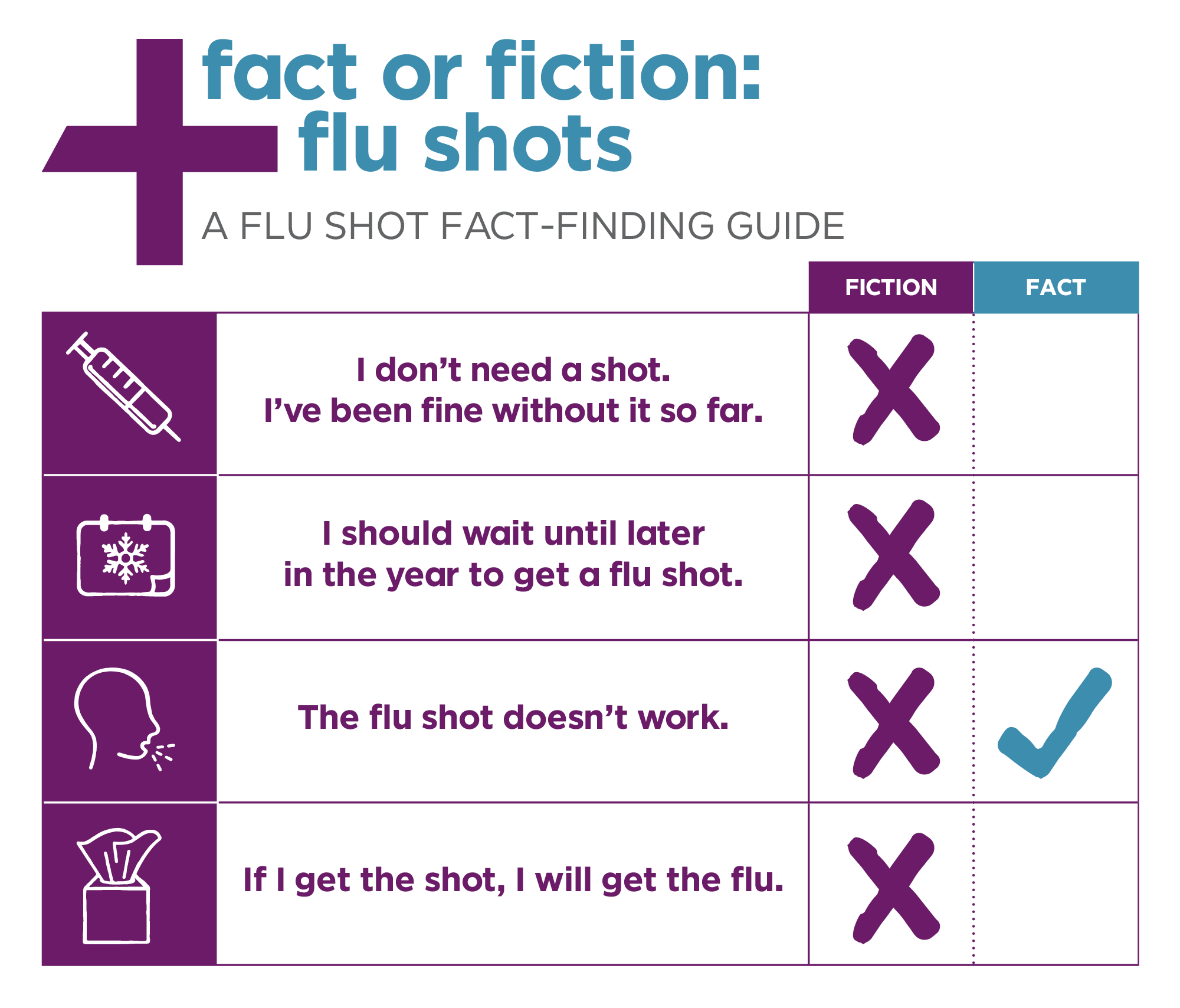August 20, 2024
It’s that time of year. From stuffy noses and sore throats to tummy troubles and body aches, it seems like almost everyone has germs to share. And while hand sanitizer, regular handwashing, and other healthy habits, like eating healthy and getting a good night sleep, are a great way to stop germs in their tracks, getting an annual flu shot is the best line of defense against viruses that cause the flu.
But, with so much information at your fingertips, it can be difficult to separate flu shot fact from flu shot fiction. And, because of some common misconceptions about flu shots, more than half of people in the United States head into flu season vaccine-less1 every year – putting not only themselves at risk for the flu, but family, friends, and coworkers, too. Can you spot flu shot facts from fiction? Read on and help stop the spread of these five common flu shot misconceptions.

Looking for an alternative version of the above infographic?
Doesn’t the flu shot make you sick?
Fiction! The flu shot itself cannot make you sick with the flu or any other illness. The flu vaccine contains either inactive flu viruses or no flu viruses at all. This means that the viruses used in the vaccine are not infectious and cannot cause illness. However, this has become one of the most common misconceptions about the flu shot, likely because people often mistake minor side effects sometimes caused by the vaccine, like muscle aches, headache, or low-grade fever, as having the flu. The large majority of people who get vaccinated, though, will only experience soreness, tenderness, or swelling around the area where the shot was given. These symptoms typically go away within a day or two.2
Also, statistically speaking, some people will come down with the flu shortly after getting the flu shot – but, again, the illness isn’t caused by the vaccine itself. The most logical explanation for this is that the person was already exposed to flu viruses shortly before or within two weeks after getting vaccinated. It typically takes two weeks for the body’s immune system to fully protect itself after getting vaccinated, so it’s completely possible to come down with the flu in that time.
MedExpress Pro Tip: Break out the frozen peas! Placing a cold pack on the area where the flu shot was given can help reduce swelling and tenderness.
Okay, fine. If the flu shot doesn’t make me sick, then how does it protect me?
Vaccines, like the flu vaccine, help the body develop immunity by imitating an infection. The inactive flu viruses in the flu vaccine cause the body’s immune system to jump into action to produce antibodies without actually causing illness. Then, when a vaccinated person comes in contact with the active virus, the immune system recognizes it and immediately produces the antibodies needed to fight it.3
Isn’t the flu just like a bad cold? I don’t need to get vaccinated.
Fiction. For many, the flu represents just a few missed workdays and some time spent recovering on the family room couch. And, yes, while most people recover completely from the flu in just a couple of weeks, the flu can cause serious complications, including pneumonia, bronchitis, and sinus and ear infections. These complications can result in hospitalizations and even death.2 In fact, the CDC estimates that the flu alone results in 140,000 to 710,000 hospitalizations each year.4
But, I’ve never even gotten the flu, so I don’t need to get vaccinated.
This is also fiction. It’s impossible to predict when you’ll get the flu, or how your body will react to the virus. Even otherwise healthy people can get the flu, and it can be serious.
Plus, for certain groups of people, like young children, pregnant women, and the elderly, even a mild strain of the flu can be particularly dangerous and can cause serious complications. That’s why it’s important to get the flu shot to not only protect yourself – but also your family, friends, neighbors, coworkers, and the community as a whole. The more people who protect against the flu with the flu shot, the less flu in general – which is good for everyone.

I heard the flu shot isn’t effective.
Fiction – and a little fact! It’s true that flu vaccines are not 100 percent effective, and the effectiveness can vary from year to year based on a number of factors, like a person’s age, overall health, and the circulating strains.2 However, research continues to support the recommendation that people should get an annual flu shot before each flu season. Don’t believe it? According to the CDC, studies show that the flu vaccine can reduce the risk of the flu by between 40 and 60 percent when most circulating flu viruses are a good match to the flu vaccine.5
Great. But, what if this year’s vaccine isn’t a good match?
Good question. If the vaccine isn’t well matched, or if there is a mutation or drift of the strain, it is true that there is a chance for a more severe flu season. However, getting a flu shot is still a very important step to protecting yourself – and others – against other circulating strains of the flu. Plus, the flu shot still helps the immune system produce antibodies to fight the flu, even if it’s not a perfect match, and can actually help reduce the severity of flu symptoms.5
MedExpress Pro Tip: Even during seasons when the flu vaccine isn’t a great match to the circulating flu strains, it’s still important to get an annual flu shot because it offers an added layer of protection that wouldn’t otherwise be possible. And, an added layer of protection could mean fewer trips to the doctor and more time spent enjoying all that winter has to offer.

Some people shouldn’t get the flu shot.
For the most part, this is fiction. The CDC recommends that everyone – yes, everyone – ages six months or older get an annual flu shot.6 However, it is true that there are some people, like those with severe, life-threatening allergies or anyone who has ever had Guillain-Barre Syndrome (GBS), should consult their doctor before getting the flu shot.2
It’s also a common misconception that people with allergies to eggs can’t get the flu shot. While most flu vaccines today are produced using an egg-based manufacturing process and contain a small amount of egg protein, studies show that allergic reactions to the flu shot are very rare. According to the CDC, those who are able to eat lightly cooked eggs without reaction, or have a history of egg allergy and have experienced hives after exposure to egg can still safely get a flu shot.7
MedExpress Pro Tip: Even if you have a severe egg allergy, talk to your doctor. There are other safe flu shot alternatives, like eggless vaccines, that your doctor can recommend so you can be protected headed into flu season.
I heard that the flu shot isn’t safe for pregnant women. Is that true?
Not true. Pregnant women can – and should – get the flu shot during any trimester of their pregnancy. Changes to the immune system, heart, and lungs during pregnancy can make pregnant women more prone to serious complications from the flu, so getting vaccinated is an important safety precaution for both mom and baby. And, if that doesn’t convince you, studies have shown that moms who get vaccinated during pregnancy can actually pass antibodies onto their developing babies and protect them against flu for the first several months after birth.8
Okay, maybe you’re right. It’s not too late to get the flu shot, is it?
Fact! It’s never too late to get a flu shot, and, while it’s recommened that people get vaccinated by September or October, there is no harm in getting it mid- to late-flu season. Most of the time, flu activity peaks between December and February – but, as long as viruses are spreading, which can be as late as May, it’s not too late to get vaccinated to protect yourself, your friends, and your family.
MedExpress Pro Tip: It takes about two weeks for your immune system to fully protect itself from the flu after the flu shot, so there’s no better time than now to get your flu shot at MedExpress. Your body will thank you.
Originally published November 2017. Updated August 2024.
References:
1 National Foundation for Infectious Diseases: U.S. Health Officials Urge Annual Influenza Vaccination for All
2 CDC: Misconceptions about Seasonal Flu and Flu Vaccines
3 CDC: Provider Resources for Vaccine Conversations with Parents
4 CDC: Key Facts About Seasonal Flu Vaccine
5 CDC: Benefits of the Flu Vaccine
6 CDC: Influenza Vaccination: A Summary for Clinicians
